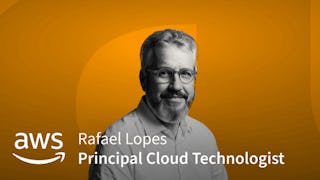- Browse
- Aws
AWS Courses
AWS courses can help you learn cloud computing fundamentals, deployment strategies, data storage solutions, and server management. You can build skills in configuring virtual networks, optimizing cloud resources, and implementing security protocols. Many courses introduce tools like Amazon EC2 for scalable computing, Amazon S3 for storage management, and AWS Lambda for serverless applications, illustrating how these skills are applied in real-world cloud environments.
Popular AWS Courses and Certifications
 Status: Free TrialFree TrialA
Status: Free TrialFree TrialAAmazon Web Services
Skills you'll gain: AWS Identity and Access Management (IAM), Amazon CloudWatch, Data Lakes, Amazon DynamoDB, Amazon Web Services, Serverless Computing, Cloud Computing, Amazon S3, Scalability, Cloud Infrastructure, Amazon Elastic Compute Cloud, Event-Driven Programming, Cloud Security, Solution Architecture, Data Visualization, Cloud Storage, Data Architecture, Cloud Computing Architecture, API Gateway, Software Architecture
Build toward a degree
4.8·Rating, 4.8 out of 5 stars7K reviewsIntermediate · Professional Certificate · 3 - 6 Months
 Status: Free TrialFree TrialStatus: AI skillsAI skillsA
Status: Free TrialFree TrialStatus: AI skillsAI skillsAAmazon Web Services
Skills you'll gain: AWS Identity and Access Management (IAM), Amazon CloudWatch, Amazon DynamoDB, Amazon Web Services, Cloud Computing, Amazon S3, Scalability, Cloud Infrastructure, Amazon Elastic Compute Cloud, Cloud Security, Cloud Computing Architecture, Serverless Computing, Cloud Storage, Databases, Virtual Networking, General Networking, Containerization
4.8·Rating, 4.8 out of 5 stars6.2K reviewsBeginner · Course · 1 - 4 Weeks
 Status: PreviewPreviewA
Status: PreviewPreviewAAmazon Web Services
Skills you'll gain: Amazon Web Services, Cloud Computing, Public Cloud, Cloud Infrastructure, Amazon Elastic Compute Cloud, Cloud Computing Architecture, Serverless Computing, Cloud Security, Amazon DynamoDB, Amazon S3, Databases, Data Storage, Network Architecture, Data Migration, Scalability
4.8·Rating, 4.8 out of 5 stars2K reviewsBeginner · Course · 3 - 6 Months
 Status: Free TrialFree TrialStatus: AI skillsAI skillsA
Status: Free TrialFree TrialStatus: AI skillsAI skillsAAmazon Web Services
Skills you'll gain: Responsible AI, Generative AI, Prompt Engineering, Amazon Bedrock, AWS SageMaker, AI Workflows, Agentic systems, AI Enablement, AI Product Strategy, Generative AI Agents, Amazon Web Services, AI Orchestration, Application Programming Interface (API), Application Development, Model Deployment, Artificial Intelligence and Machine Learning (AI/ML), Artificial Intelligence, LLM Application, Solution Architecture, Data Management
4.6·Rating, 4.6 out of 5 stars98 reviewsBeginner · Professional Certificate · 1 - 3 Months
 Status: Free TrialFree TrialL
Status: Free TrialFree TrialLLearnKartS
Skills you'll gain: Cloud Computing, Technical Support, Resource Management, Cost Management
4.5·Rating, 4.5 out of 5 stars128 reviewsBeginner · Specialization · 1 - 3 Months
 A
AAmazon Web Services
Skills you'll gain: AWS Identity and Access Management (IAM), Infrastructure as Code (IaC), Large Language Modeling, Amazon CloudWatch, AWS CloudFormation, Amazon DynamoDB, Software Development Life Cycle, CI/CD, Amazon Web Services, Professional Networking, Prompt Engineering, Cloud Computing, Generative AI, Extract, Transform, Load, Software Architecture, Cloud Computing Architecture, Cloud Management, Data Management, Problem Solving, Teamwork
Build toward a degree
4.8·Rating, 4.8 out of 5 stars6.9K reviewsBeginner · Professional Certificate · 3 - 6 Months
What brings you to Coursera today?
 A
AAmazon Web Services
Skills you'll gain: AWS Identity and Access Management (IAM), Infrastructure as Code (IaC), Command-Line Interface, Amazon CloudWatch, AWS CloudFormation, Root Cause Analysis, Amazon DynamoDB, Customer Relationship Building, Network Troubleshooting, Amazon Web Services, Customer Relationship Management, Software Architecture, Linux Commands, Cloud Computing, Linux, Amazon S3, Web Applications, Information Technology, Customer Service, Software Development
4.8·Rating, 4.8 out of 5 stars6.7K reviewsBeginner · Professional Certificate · 3 - 6 Months
 Status: Free TrialFree TrialStatus: AI skillsAI skillsA
Status: Free TrialFree TrialStatus: AI skillsAI skillsAAmazon Web Services
Skills you'll gain: Amazon Bedrock, Prompt Engineering, Responsible AI, Generative AI Agents, Retrieval-Augmented Generation, Generative AI, LangChain, AI Workflows, AI Orchestration, Artificial Intelligence and Machine Learning (AI/ML), Large Language Modeling, Applied Machine Learning, Transfer Learning, LLM Application, Embeddings, Amazon Web Services, Context Management, Model Deployment, Amazon S3, Model Evaluation
4.7·Rating, 4.7 out of 5 stars70 reviewsIntermediate · Professional Certificate · 1 - 3 Months
 A
AAmazon Web Services
Skills you'll gain: Prompt Engineering, Amazon Bedrock, Responsible AI, Infrastructure as Code (IaC), Amazon CloudWatch, Application Deployment, Amazon Elastic Compute Cloud, CI/CD, AWS CloudFormation, Unit Testing, Continuous Deployment, Cloud Deployment, Continuous Integration, DevOps, Devops Tools, Code Review, Amazon Web Services, Serverless Computing, Containerization, Data Analysis
4.6·Rating, 4.6 out of 5 stars44 reviewsBeginner · Specialization · 1 - 3 Months
 Status: Free TrialFree TrialL
Status: Free TrialFree TrialLLearnKartS
Skills you'll gain: AWS Identity and Access Management (IAM), Amazon Web Services, Serverless Computing, Amazon S3, Identity and Access Management, Disaster Recovery, Amazon Elastic Compute Cloud, Amazon CloudWatch, Cloud Computing Architecture, Amazon Redshift, Amazon DynamoDB, Solution Architecture, Cloud-Native Computing, Containerization, Cloud Infrastructure, Cloud Engineering, Kubernetes, Cloud Computing, Hybrid Cloud Computing, API Gateway
4.1·Rating, 4.1 out of 5 stars44 reviewsIntermediate · Specialization · 1 - 3 Months
 Status: Free TrialFree TrialA
Status: Free TrialFree TrialAAmazon Web Services
Skills you'll gain: AWS Identity and Access Management (IAM), Amazon CloudWatch, Amazon Web Services, Serverless Computing, Amazon DynamoDB, Cloud Computing, Amazon S3, Scalability, Cloud Infrastructure, Event-Driven Programming, Cloud Storage, Solution Architecture, Cloud Computing Architecture, Data Migration, API Gateway, Amazon Elastic Compute Cloud, Public Cloud, Database Systems, Software Architecture, Cloud Security
4.8·Rating, 4.8 out of 5 stars6.7K reviewsBeginner · Specialization · 1 - 3 Months
 Status: Free TrialFree TrialL
Status: Free TrialFree TrialLLearnKartS
Skills you'll gain: Prompt Engineering, Computer Vision, Data Wrangling, Artificial Intelligence, Cloud Security, Embeddings, Model Deployment, MLOps (Machine Learning Operations), Data Security, Data Governance, Deep Learning, Encryption, Public Cloud, General Data Protection Regulation (GDPR)
4.4·Rating, 4.4 out of 5 stars10 reviewsBeginner · Specialization · 1 - 3 Months
What brings you to Coursera today?
In summary, here are 10 of our most popular aws courses
- AWS Cloud Solutions Architect: Amazon Web Services
- AWS Cloud Technical Essentials: Amazon Web Services
- AWS Cloud Practitioner Essentials: Amazon Web Services
- AWS Generative AI Applications: Amazon Web Services
- AWS Cloud Practitioner Exam Prep: LearnKartS
- AWS Cloud Technology Consultant: Amazon Web Services
- AWS Cloud Support Associate: Amazon Web Services
- AWS Generative AI and AI Agents with Amazon Bedrock: Amazon Web Services
- DevOps and AI on AWS: Amazon Web Services
- AWS Solutions Architect Associate Exam Prep: LearnKartS
Frequently Asked Questions about Aws
AWS, or Amazon Web Services, is a comprehensive cloud computing platform provided by Amazon. It offers a wide range of services, including computing power, storage options, and networking capabilities, which are essential for businesses of all sizes. The importance of AWS lies in its ability to provide scalable and flexible solutions that can adapt to the needs of organizations, enabling them to innovate and grow without the constraints of traditional IT infrastructure.
With skills in AWS, you can pursue various job roles such as Cloud Solutions Architect, Cloud Support Associate, AWS Developer, Data Engineer, and Cloud Technology Consultant. These positions are in high demand as more companies migrate to cloud-based solutions, making AWS expertise a valuable asset in the job market.
To learn AWS effectively, you should focus on acquiring skills such as cloud computing fundamentals, networking, security, and data management. Familiarity with programming languages like Python or Java can also be beneficial, as well as understanding AWS services like EC2, S3, and RDS. Additionally, gaining experience with DevOps practices and tools can enhance your proficiency in AWS.
Some of the best AWS courses online include the AWS Cloud Solutions Architect Professional Certificate and the AWS Cloud Support Associate Professional Certificate. These programs provide structured learning paths and hands-on projects to help you build practical skills.
Yes. You can start learning AWS on Coursera for free in two ways:
- Preview the first module of many AWS courses at no cost. This includes video lessons, readings, graded assignments, and Coursera Coach (where available).
- Start a 7-day free trial for Specializations or Coursera Plus. This gives you full access to all course content across eligible programs within the timeframe of your trial.
If you want to keep learning, earn a certificate in AWS, or unlock full course access after the preview or trial, you can upgrade or apply for financial aid.
To learn AWS, start by exploring foundational courses that introduce you to cloud computing concepts. Engage with hands-on labs and projects to apply what you learn. Consider pursuing professional certificates, such as the AWS Cloud Technology Consultant Professional Certificate, to gain structured knowledge and credentials.
Typical topics covered in AWS courses include cloud architecture, security best practices, data storage solutions, and application deployment. You will also learn about specific AWS services, such as EC2, S3, Lambda, and RDS, as well as how to manage and optimize cloud resources effectively.
For training and upskilling employees, the AWS Cloud Solutions Architect Professional Certificate and the AWS Certified Data Engineer Associate Specialization are excellent choices. These programs provide comprehensive training that equips teams with the skills needed to leverage AWS effectively in their roles.










